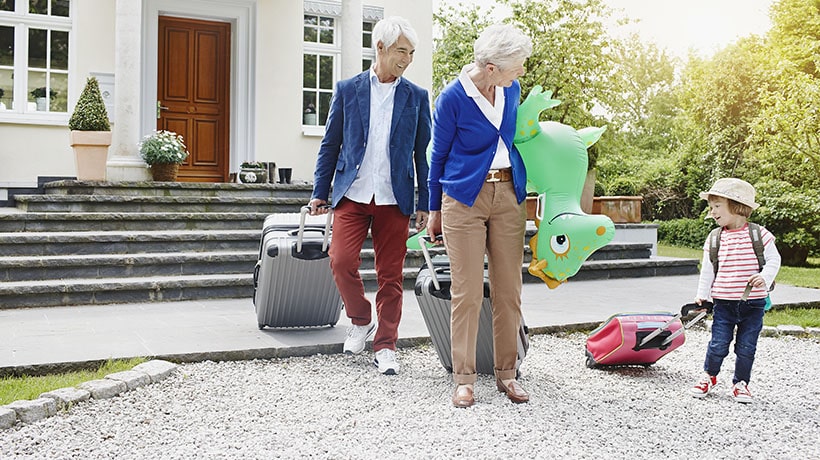
This article is for general guidance only and is not financial or professional advice. Any links are for your own information, and do not constitute any form of recommendation by Saga. You should not solely rely on this information to make any decisions, and consider seeking independent professional advice. All figures and information in this article are correct at the time of publishing, but laws, entitlements, tax treatments and allowances may change in the future.
Being a grandparent can be one of life’s most rewarding experiences. And if you want to give them a helping hand, putting some money away for your grandchildren can help them off to a great financial start in life.
Investing can be one of the most thoughtful and impactful gifts you give, according to Jordan Clark, Financial Planner at Quilter. “It’s a serious financial leg up when it comes to life goals such as saving for a house or paying for higher education.”
What's on this page?
.jpg?sc=max&mw=800&h=450&la=en&h=731&w=1300&hash=4B225014A1F4F5BEE37672F672ECB805)
“While traditional saving accounts offer safety, investing opens up the potential for greater growth over the long term,” Quilter says. Investments rise and fall in value but – providing you’re investing for at least five years – you should be able to ride out those bumps and you’re likely to enjoy a better return than you’d get from a cash savings account.
Figures from data company Morningstar Direct show how the returns could stack up for a lucky grandchild. An investment of £1,000 in November 2006 would have grown to £3,742 by November 2024 in the average global fund (before any fees), or £2,577.80 in a UK fund – equivalent to annual growth rates of 7.61% and 5.40% respectively.
In comparison, the same £1,000 would be worth just £1,233 if it had been left in the average savings account with an annual growth rate of just 1.17%.
There are thousands of investments available, so knowing where to invest to give them the best financial start can feel overwhelming. Alice Haine, Personal Finance Analyst at investment platform Bestinvest by Evelyn Partners, says the key to performance is diversification.
“Aim to spread a grandchild’s investment portfolio across different asset classes, sectors and regions. Failing to do so can eat into returns if the chosen investments suffer significant declines,” she explains.
While it’s possible to build a portfolio of shares, Vanguard’s Norton says a global fund providing a spread of shares and bonds is a great way to start. “We don’t believe in buying individual shares. It doesn’t provide sufficient diversification and it’s hard to pick the winners. A global tracker fund gives them exposure to every large company on major stock markets, including the winners. Don’t look for the needle in the haystack, buy the haystack,” he says.
A ready-made portfolio could be another option if you’re not sure where to start. This can take a lot of the guesswork out of investing for your grandchild, pulling together a portfolio of investments that match your objectives and timeframes.
However, Quilter’s Clark says they’re not for everyone. “They’re great if you’re unsure where to start, but some grandparents prefer to take a more active role, particularly if they want to align their investments with values, such as ethical or sustainable funds.”
A lump sum can be a lovely gesture, especially for occasions like the birth of the grandchild, birthdays and Christmas. On the other hand, setting up a monthly contribution into a grandchild’s investment plan is a simple, low-maintenance way to build up their nest egg.
This might help you to plan your outgoings, and can mean the payments don’t need to take up much of your time. Many investment platforms allow you to start regular investing from as little as £25 a month, with options to skip a month if needed.
There are further benefits too. “It helps to keep the emotion out of investing and removes the temptation to time the markets,” says Haine. “You can also take advantage of pound cost averaging.”
With regular investment, rather than buying at a single price point, when the market could potentially be at its peak, you dripfeed it in on a regular basis. This cushions you from some of the effects of volatility as you’ll buy when prices are low as well as when they’re high.
Whether you go for a lump sum or a more regular habit, the key is starting early. “That first £1 is the most valuable of all,” adds Haine. “It has the longest time to grow in value and cash in on the compounding effect.” And, once your investment is up and running, you can sit back and enjoy it grow alongside your grandchild.

Junior ISAs (JISAs) are a popular option for children's investments. Around £1.5bn was paid into 1.25 million Junior ISAs in the 2022/23 tax year, Government statistics show, with more than half paid into investment ISAs rather than cash ISAs.
Their tax-free status is a key draw of Junior ISAs, with no need to worry about income or capital gains tax. Only parents or guardians can open a Junior ISA, but anyone, including doting grandparents, can pay in up to the £9,000 annual limit (2024/25) with it all locked away until they turn 18.
James Norton, Head of Retirement & Investments at Vanguard Europe, says even a modest contribution can grow into a chunky pot. “Just £500 paid into a Junior ISA every year for 18 years would grow to around £16,500, based on a hypothetical return of 6%,” he explains.
“This creates a useful pot that a grandchild could continue to invest or put towards expenses such as university or a deposit on a first home.”
The possible downside is that your grandchild will be able to spend it however they want when they turn 18.
If the prospect of your grandchild getting their hands on a sum of cash at 18 makes you nervous, there’s nothing to stop you using some of your own ISA allowance for your grandkids’ savings.
There are pros and cons to this, according to Laura Suter, Director of Personal Finance at AJ Bell. “If you have spare ISA allowance and you want the flexibility to access the money before your grandchild’s 18th birthday, it can be a good option,” she says, pointing to driving lessons and first cars as possible pre-18 expenses.
“But, if you’re worried you might dip into it, you may be better going for a Junior ISA where the money is ringfenced for your grandchild.” A Junior ISA might be better if you’ve already used your own ISA allowance for your grandkids’ savings.
There are pros and cons to this, according to Laura Suter, Director of Personal Finance at AJ Bell.
“If you have spare ISA allowance and you want the flexibility to access the money before your grandchild’s 18th birthday, it can be a good option,” she says, pointing to driving lessons and first cars as possible pre-18 expenses.
“But, if you’re worried you might dip into it, you may be better going for a Junior ISA where the money is ringfenced for your grandchild.” A Junior ISA might be better if you’ve already used your own ISA allowance.
Fears over the financial prowess of 18-year-olds can even prompt some grandparents to opt for pensions for their grandchildren. You can pay in up to £2,880 a year, which is topped up to £3,600 with tax relief from the government.
Suter says: “Pensions are a very long-term option as your grandchild won’t be able to access the money until they reach retirement age. However, if you made just one contribution of £2,880 at birth and it grew by 5% a year, they could have a pot worth £46,500 by the age of 57.”
Another option if you want more control is to put the money into trust. The simplest way to do this is with a bare trust, which can incorporate many investment products.
With a bare trust, your grandchild will still legally be entitled to the money at age 18 (or 16 in Scotland) but there’s nothing to stop you dipping in before they reach this milestone – providing the withdrawal is for their benefit. If you still feel nervous, a more bespoke trust could be worth considering.
“Using a trust provides an added layer of control and can help ensure the money is used for its intended purpose,” says Clark. “But they can be complex so it’s worth seeking advice if you’re considering this route.”


From toys to board games to prepaid cards, we've researched the top options.




